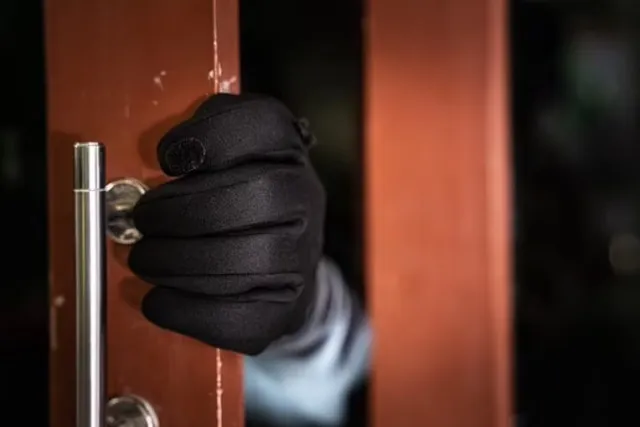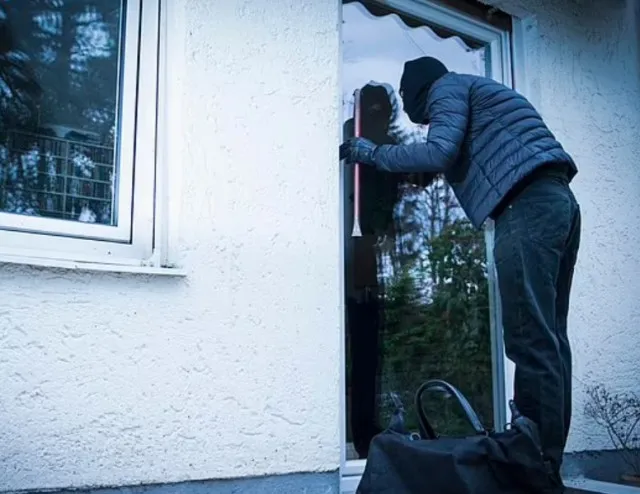Have you ever heard a knock at your door and decided to ignore it? You’re not alone. Many people avoid answering their doors, especially when they’re not expecting visitors. However, a recent warning from a Canadian police officer has shed light on the potential dangers of this seemingly harmless habit. Officer Arsenault, a TikTok-famous officer, has shared vital insights into why acknowledging an unexpected knock might be crucial for your safety.
The Risks of Ignoring a Knock

It might feel safer to avoid answering the door, especially if you don’t recognize who’s on the other side. But according to Officer Arsenault, this assumption could be dangerous. Ignoring knocks or doorbell rings could signal to potential intruders that no one is home, increasing the likelihood of a break-in.
“Two minutes later, they kick in your doors—it’s daytime break and enter,” Officer Arsenault explains in his viral video. Criminals often target homes during the day when they expect no one to be inside. If they believe the house is empty, they might force entry, potentially creating a risky and frightening situation.
Why Home Invasions Happen During the Day
Most people associate burglaries with nighttime. However, statistics show that many home invasions occur during daylight hours. Why? Criminals often assume that residents are at work or school, leaving homes unguarded. A knock on the door is often their way of testing whether someone is inside.
If no one responds, it’s an open invitation for them to act. But if they hear a voice or see movement, they’re more likely to retreat, fearing confrontation or exposure.
Practical Steps to Stay Safe
So, what should you do when someone unexpectedly knocks at your door? Officer Arsenault and security experts offer several practical tips:
1. Make Your Presence Known
Avoid the temptation to stay silent. A simple “Who is it?” through the door or even making noise can be enough to deter potential intruders. You don’t have to open the door, but letting them know someone is home can make all the difference.
2. Use Door Security Features
Investing in a peephole, security camera, or smart doorbell can help you safely identify who’s at the door without opening it. These tools allow you to see and even communicate with the person outside while maintaining a secure barrier.
3. Lock All Entry Points
Before answering the door, ensure that all other entry points, such as back doors and windows, are securely locked. This minimizes the risk of someone gaining access from another point.
4. Pretend You’re Not Alone

If you’re home alone and feel uncomfortable, pretend you’re not. Speaking loudly as if addressing someone else in the house or pretending to be on a phone call can give the impression that others are present.
Building Community for Added Security
A strong sense of community can significantly enhance safety. Building good relationships with your neighbors allows for mutual vigilance. Neighbors can keep an eye out for suspicious activity and alert each other when something seems off.
When communities work together, they create an environment where criminals are less likely to operate. This proactive approach strengthens overall neighborhood safety.
Social Media’s Take on the Advice
Officer Arsenault’s advice has struck a chord with many online. Viewers on TikTok and other platforms have shared their gratitude and personal experiences. Some users admitted they had been ignoring knocks for years, while others revealed creative ways to make their homes appear occupied.

One user shared, “I leave my husband’s dirty boots outside the door—even when he’s not home.” Another added, “I’ve been ignoring knocks for years, but now I’ll start responding in some way.”
While there are differing opinions on the best course of action, the consensus is clear: taking proactive steps can reduce risks.
Debunking Common Misconceptions
Some people believe that ignoring a knock is safer, especially for women living alone. While it’s essential to prioritize personal safety, completely ignoring the door might inadvertently increase risks. A middle ground—acknowledging the knock without opening the door—is often the safest option.
Similarly, the notion that daytime is safe from break-ins is misleading. Criminals are opportunists, and the daylight hours provide an excellent cover for them to blend in, appearing as delivery personnel or repair workers.
Simple Yet Effective Safety Practices

Here are additional tips to consider for keeping your home safe:
- Install Motion-Activated Lights: These lights can startle potential intruders and make them think twice before approaching.
- Use a Home Security System: Even a basic alarm system can act as a deterrent.
- Create a Daily Routine: Routinely check your locks and security features, especially before leaving home.
- Avoid Over-Sharing on Social Media: Announcing your absence online could make your home a target.
Conclusion
Ignoring an unexpected knock at the door might seem like the safest option, but it can invite unnecessary risks. Acknowledging the knock—without opening the door—signals to potential intruders that the home isn’t empty, which can deter their plans. By following Officer Arsenault’s advice and adopting proactive safety measures, you can better protect your home and loved ones.
Your safety starts with awareness and small, deliberate actions. So the next time you hear an unexpected knock, remember: a little caution and preparedness can go a long way in keeping you safe.


